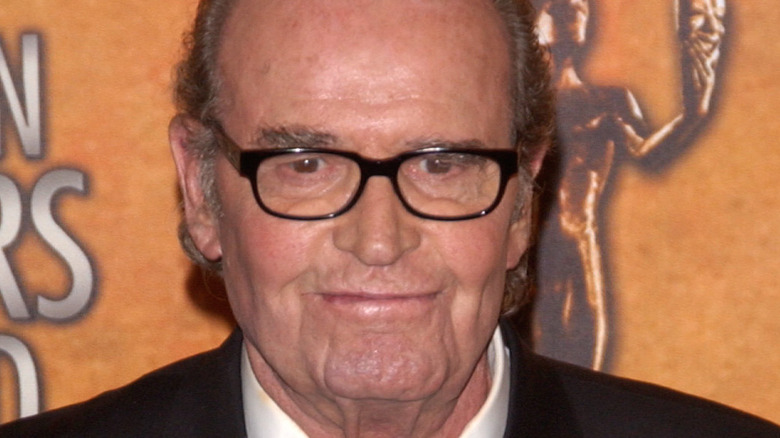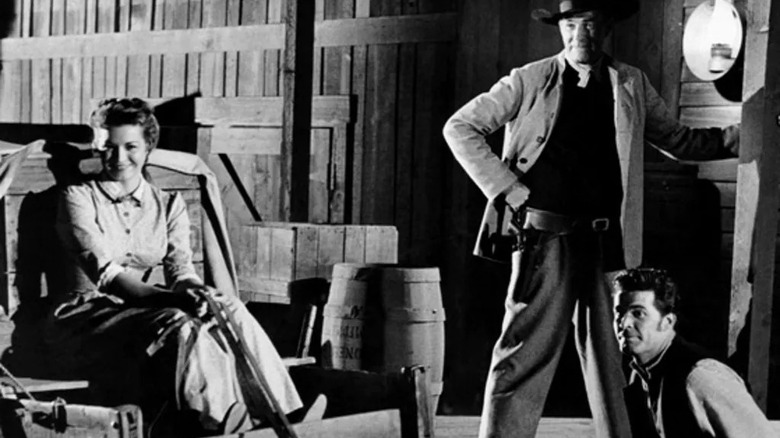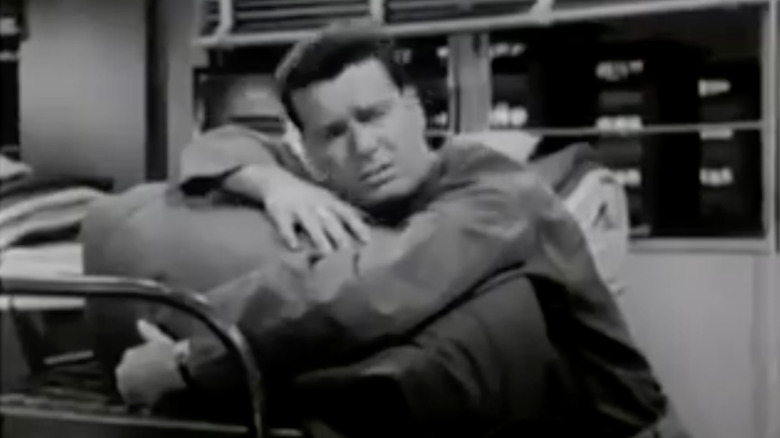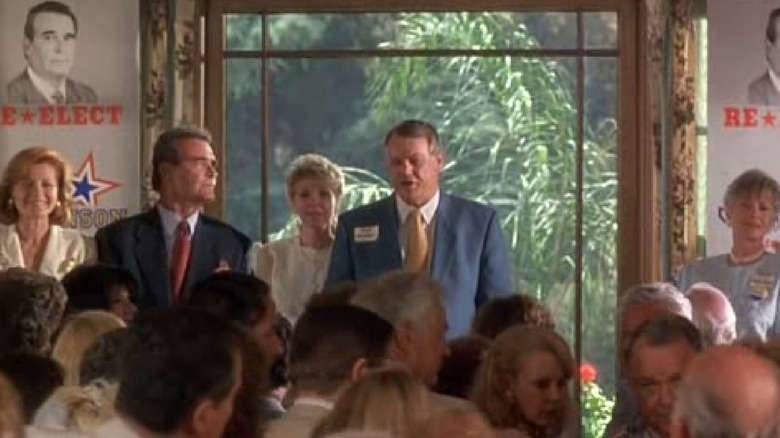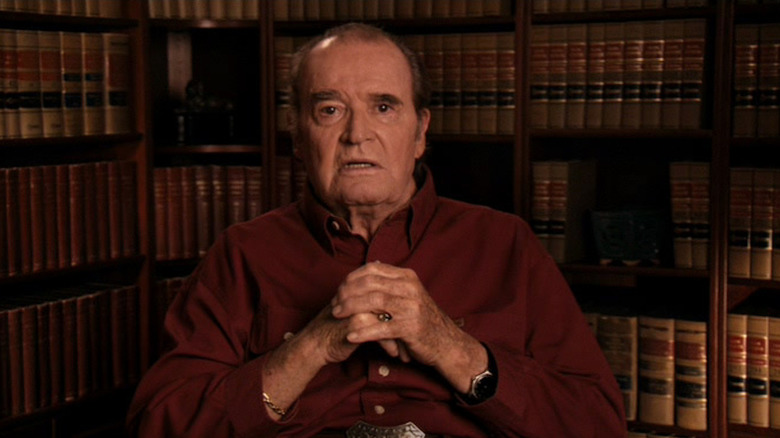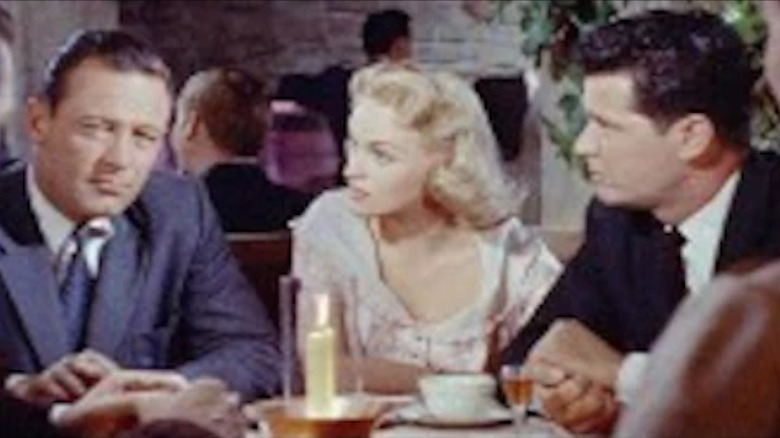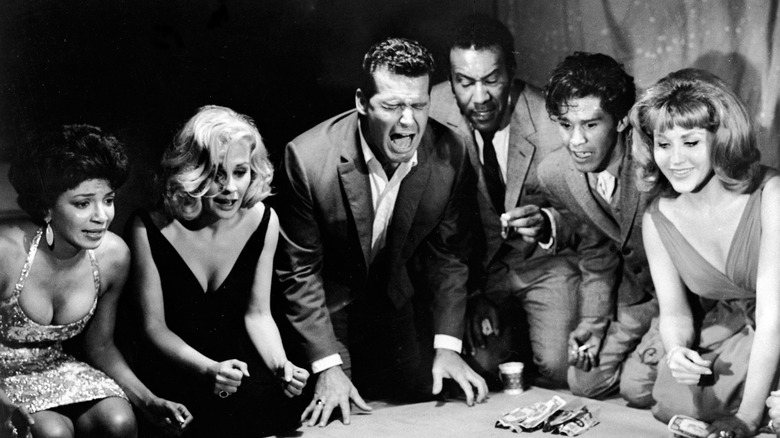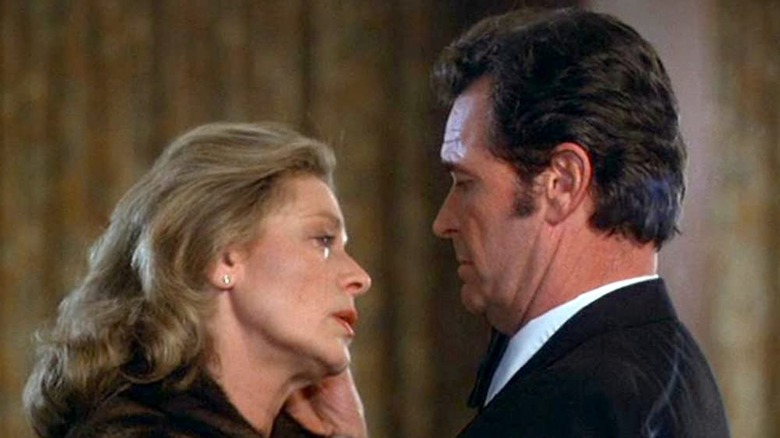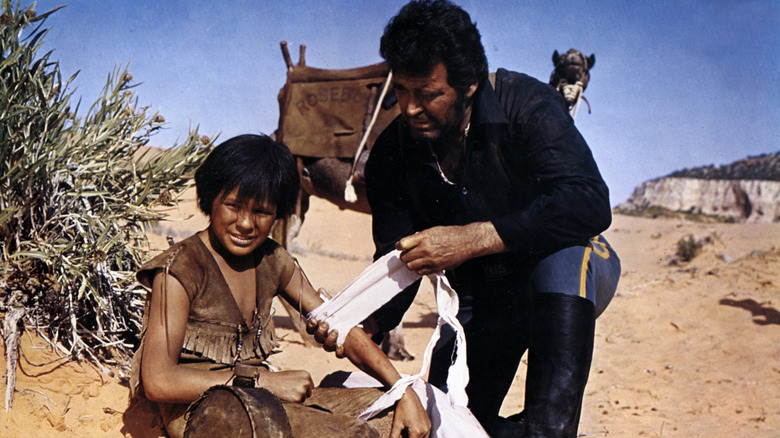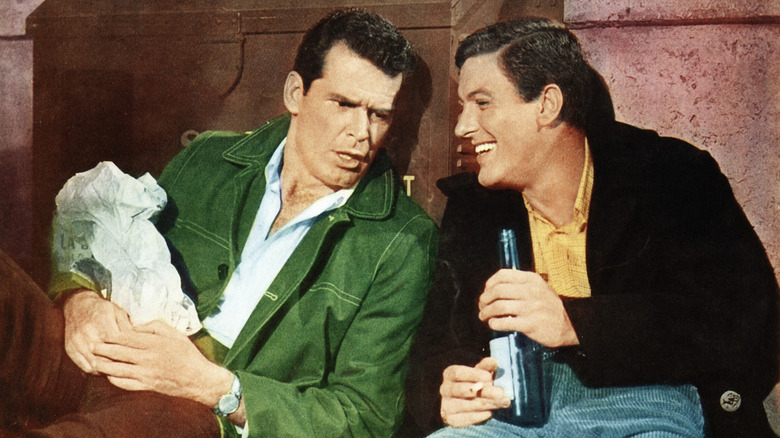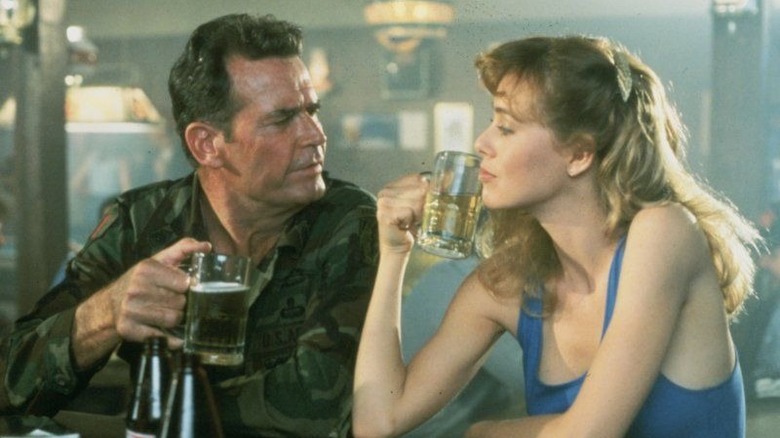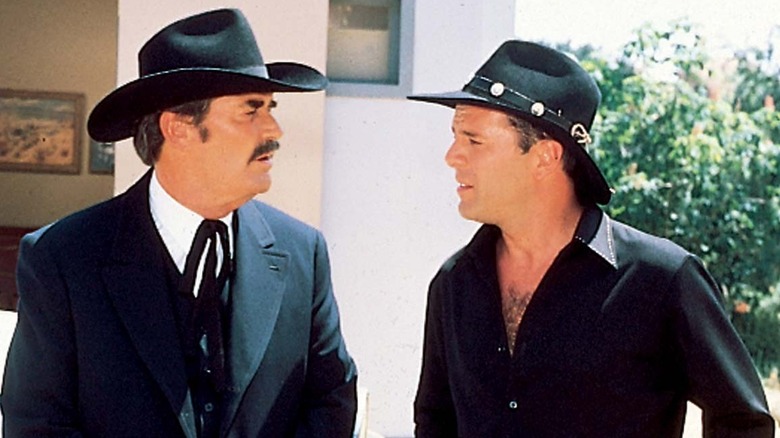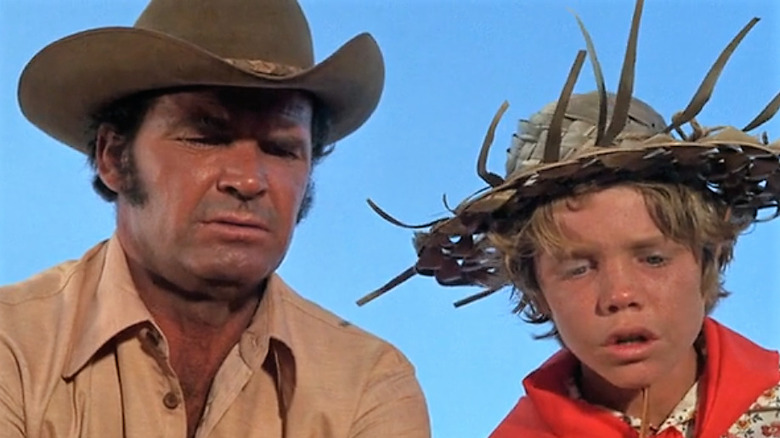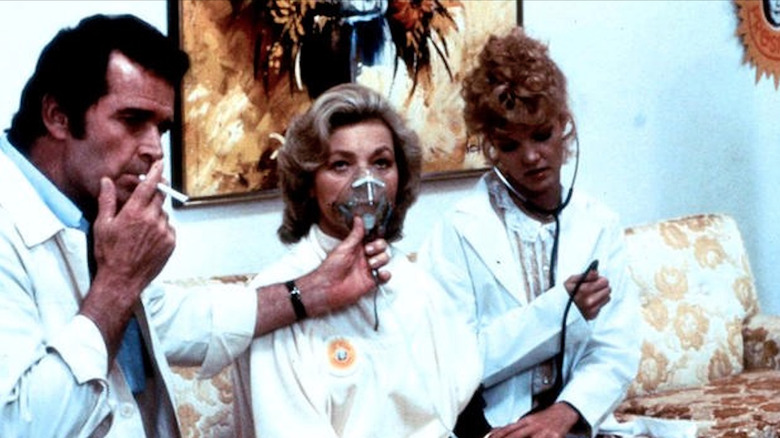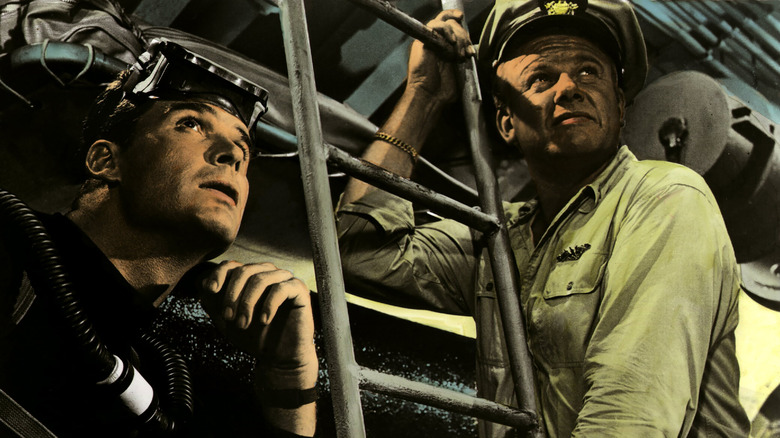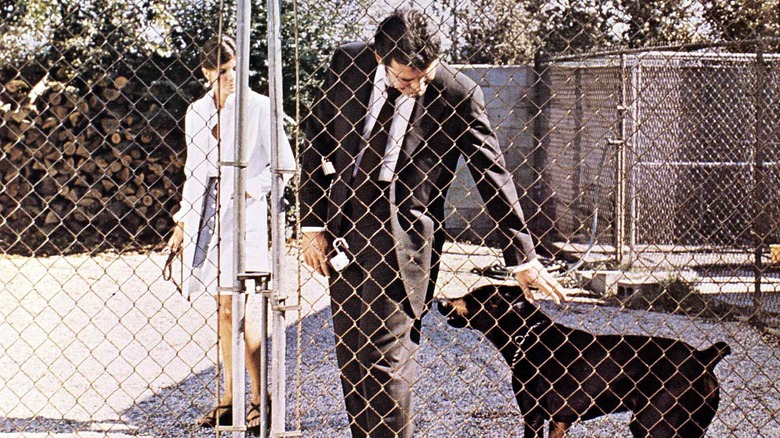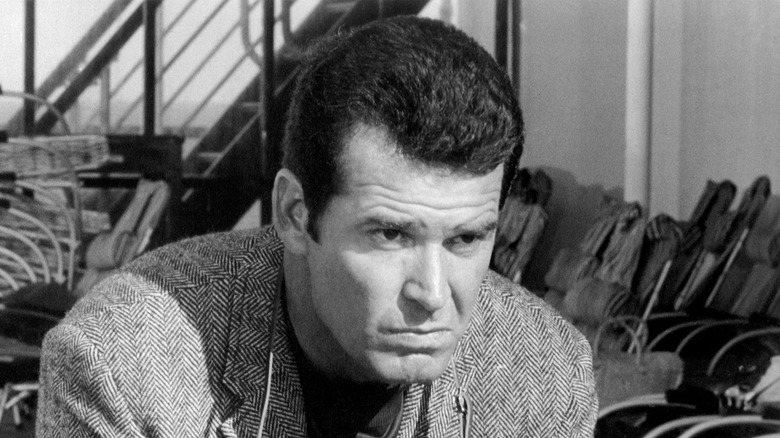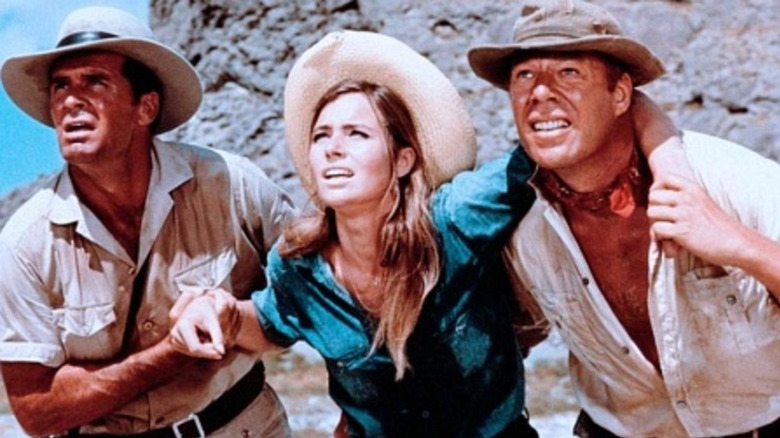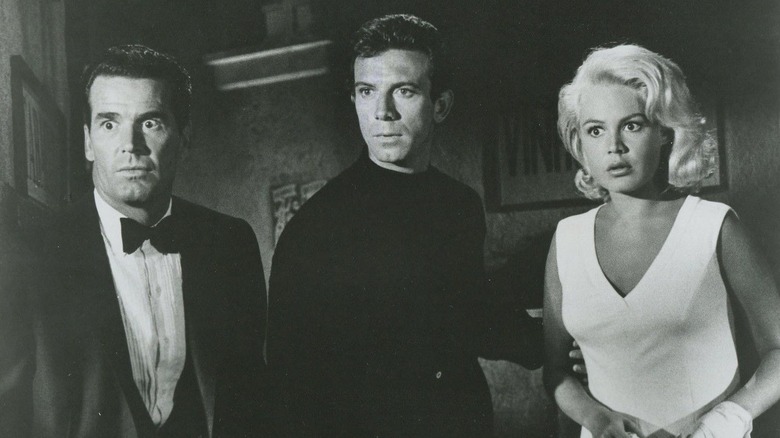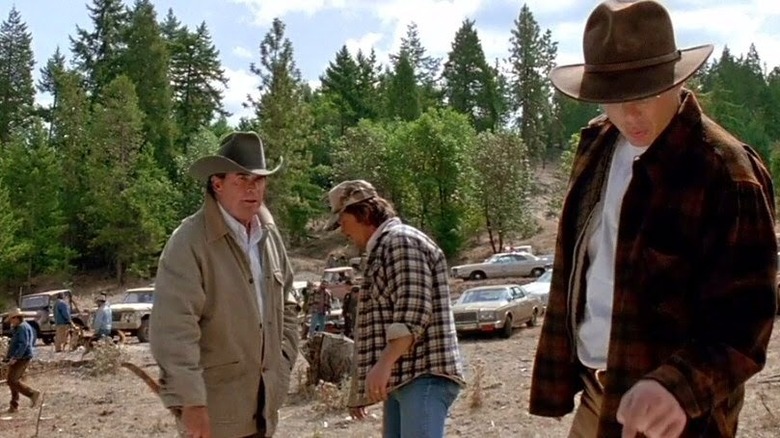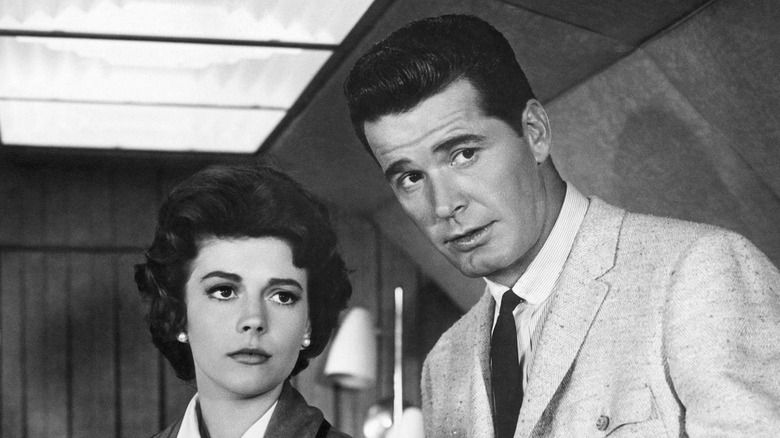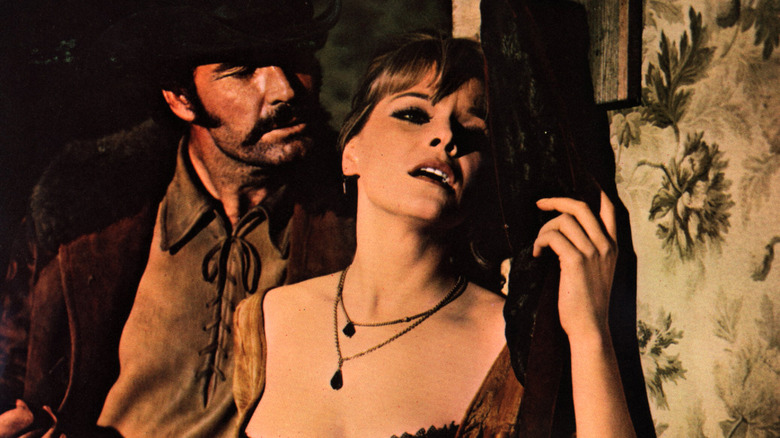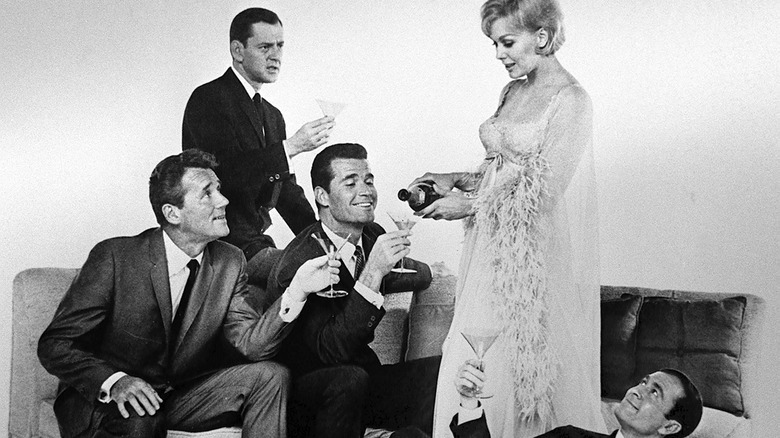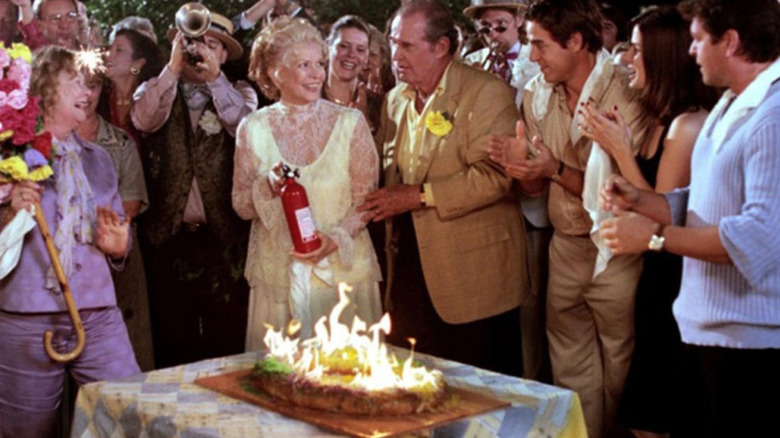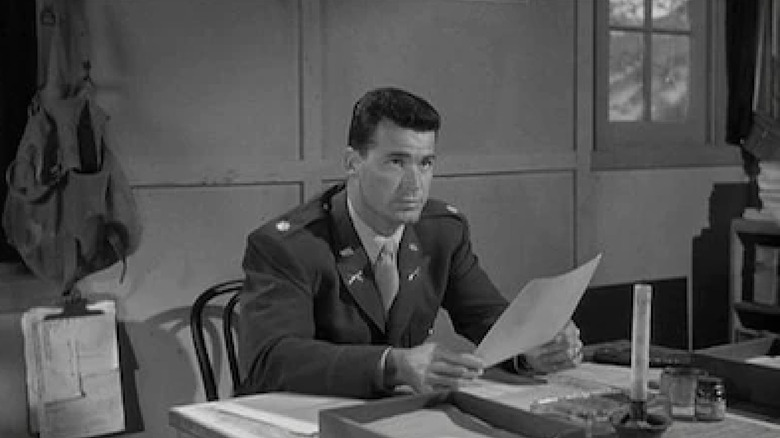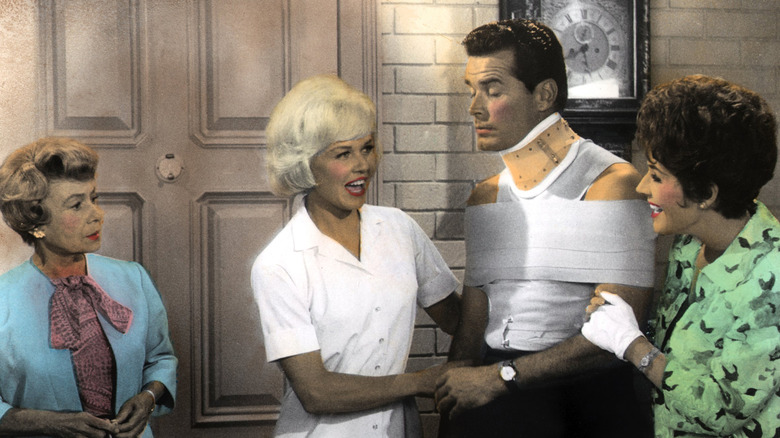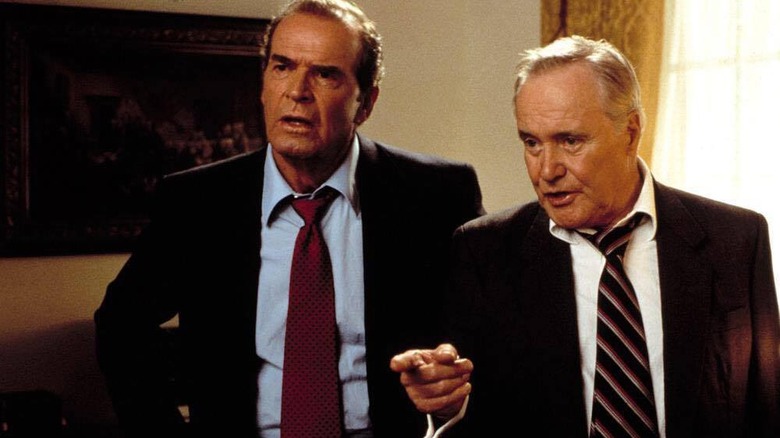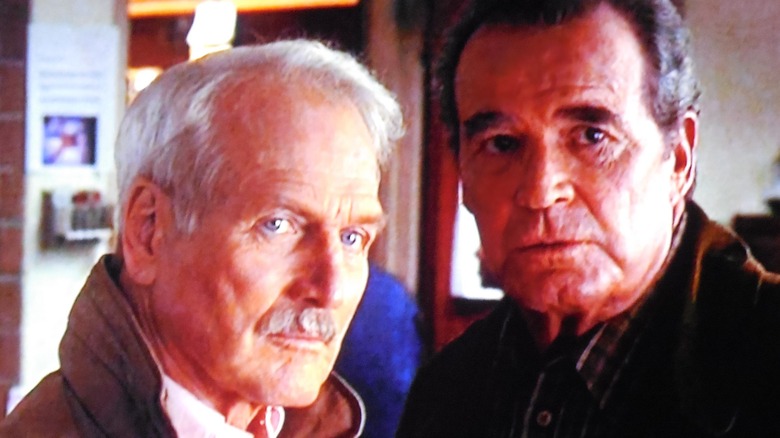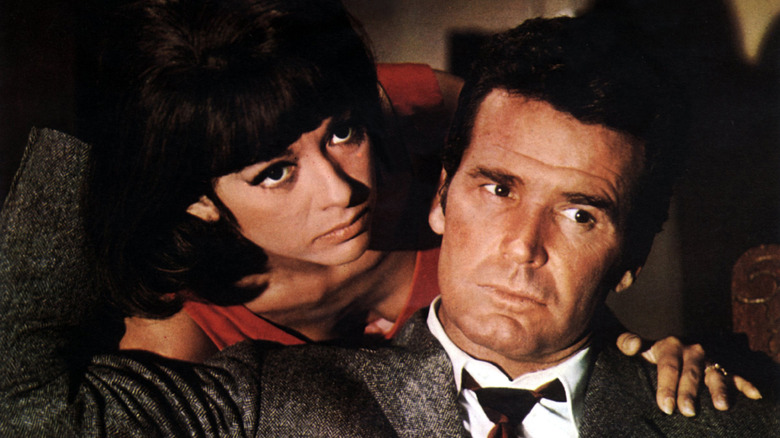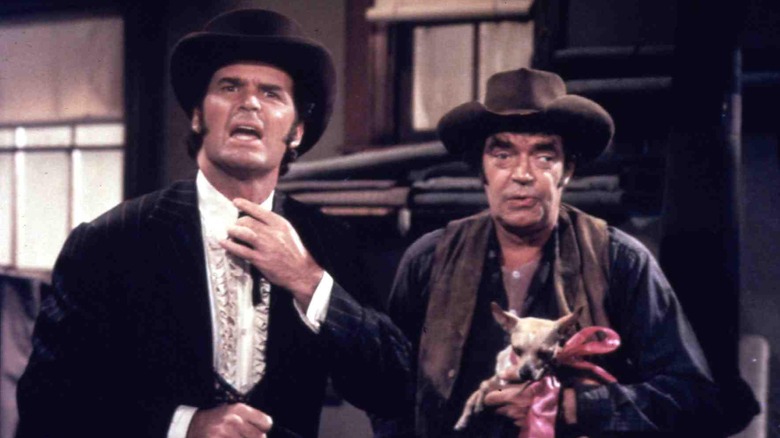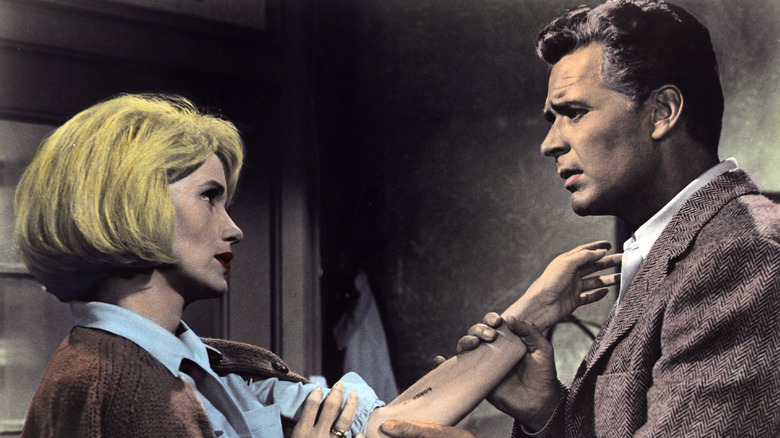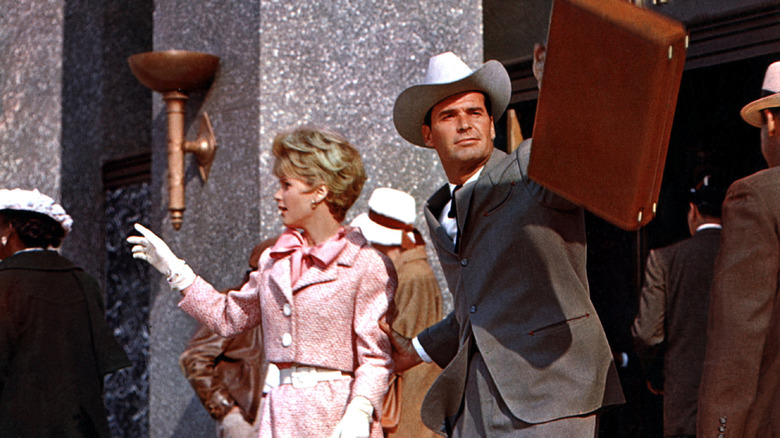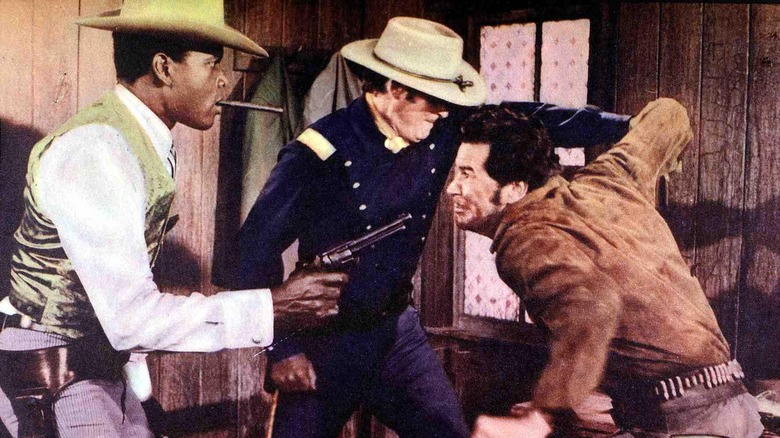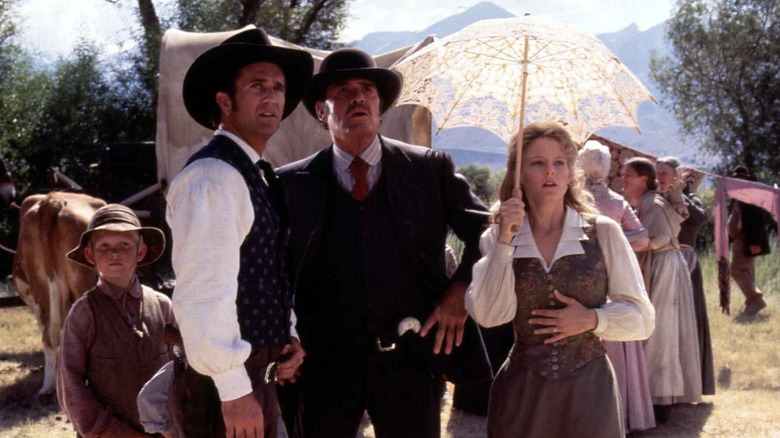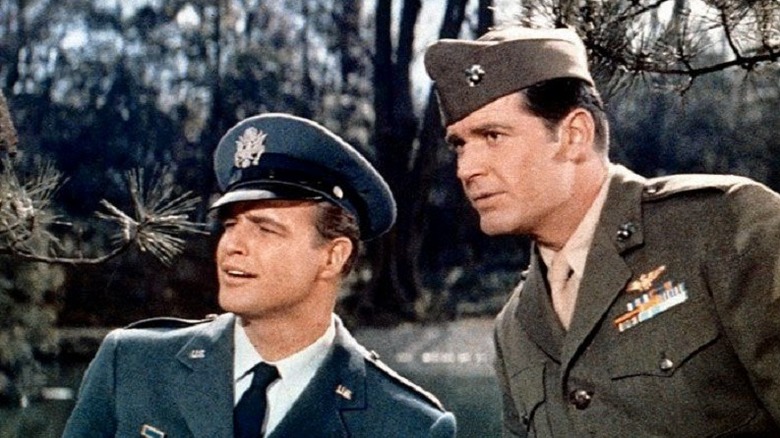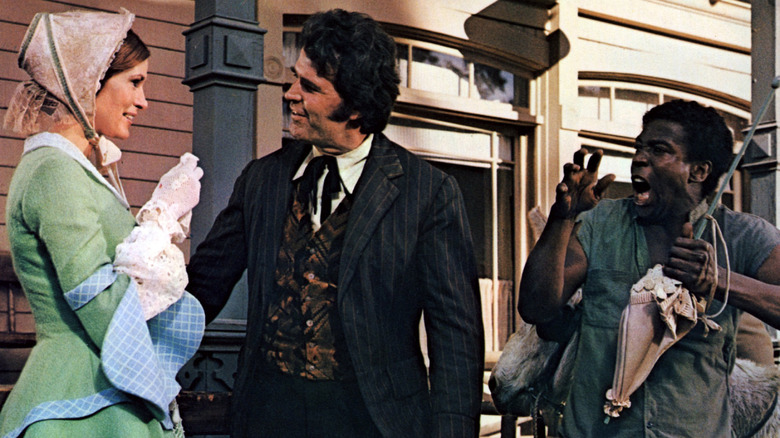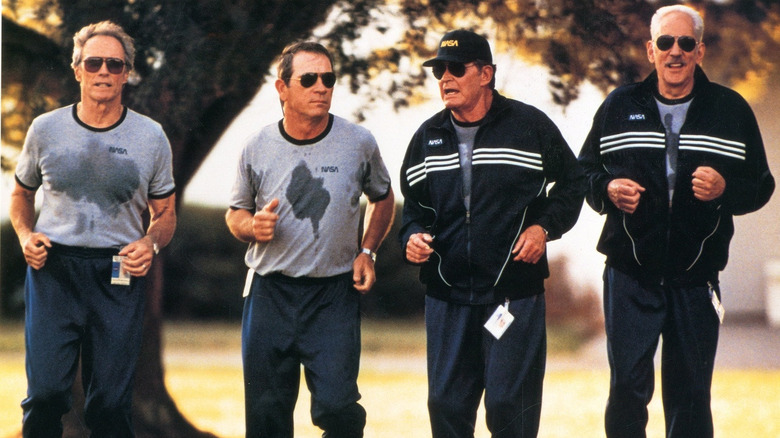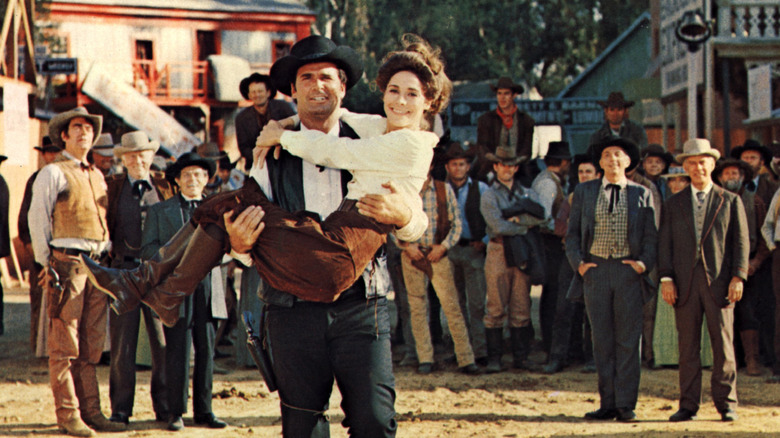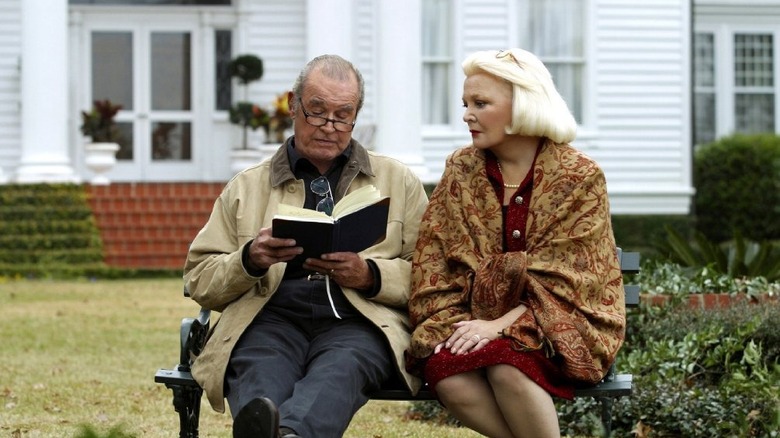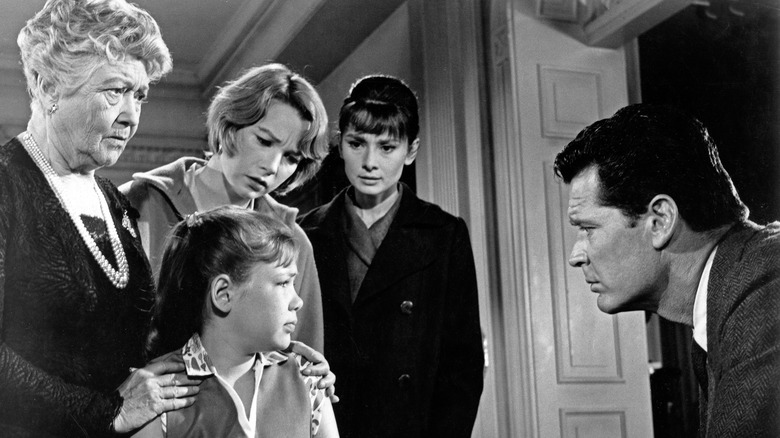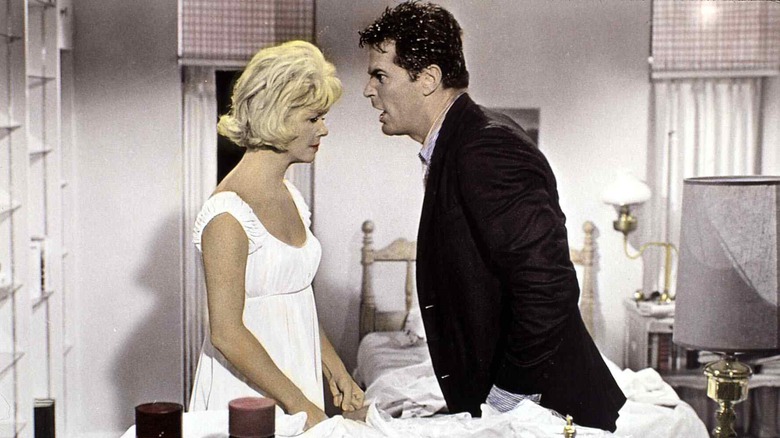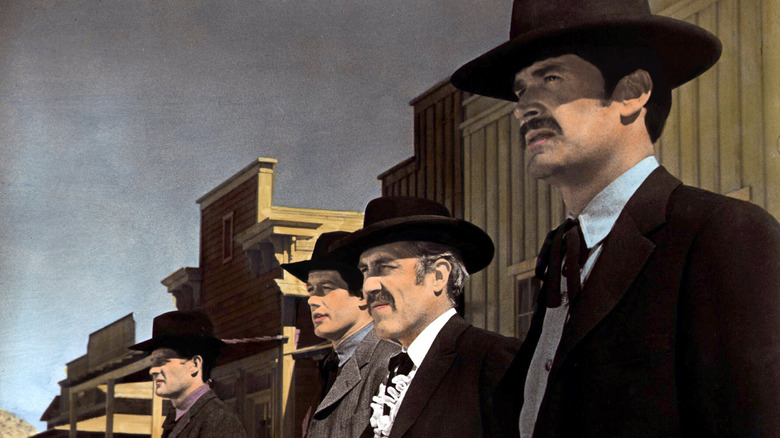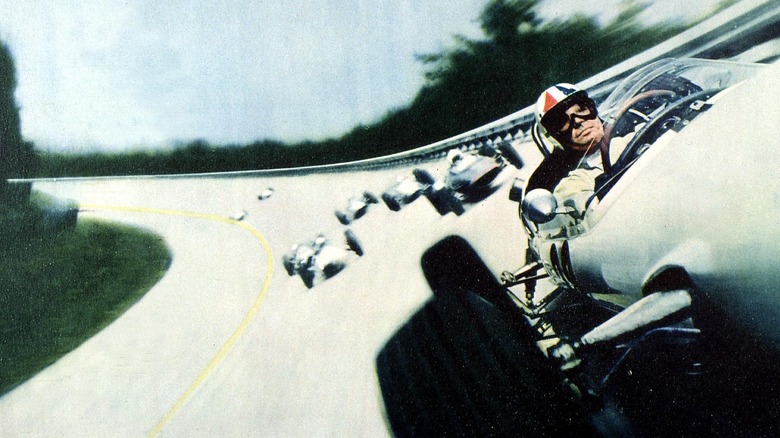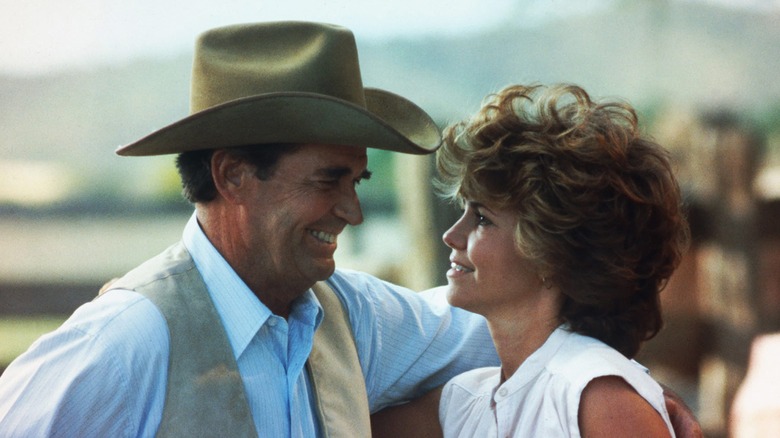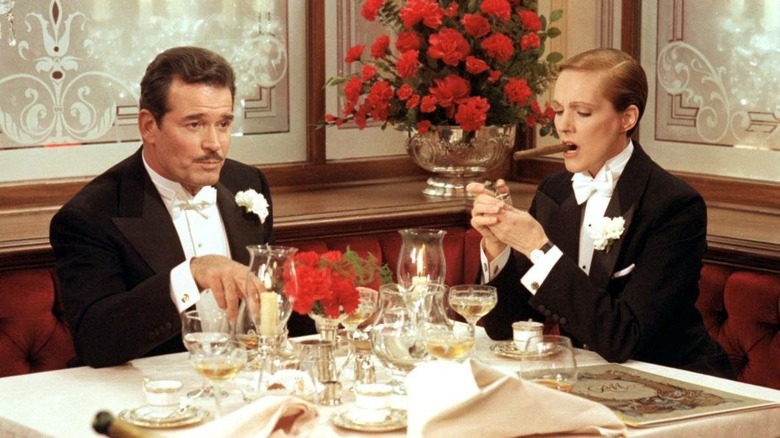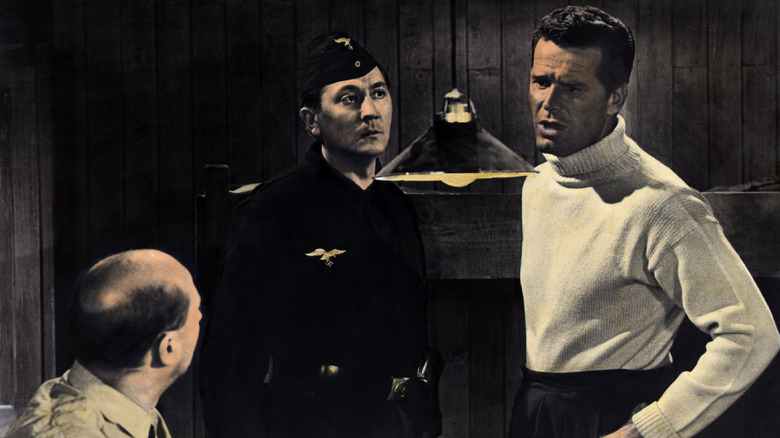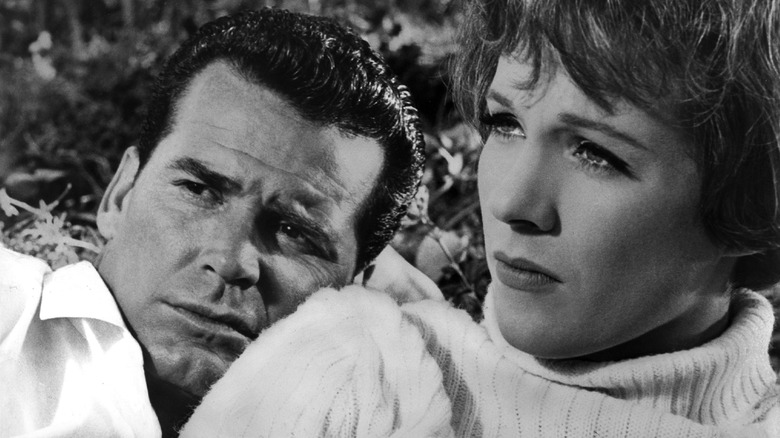The 46 Greatest James Garner Movies Ranked Worst To Best
Whether in film or television, you always knew you were in for a treat whenever James Garner appeared on screen. For more than 50 years the strikingly handsome actor leant his easy going charm to a wide variety of roles, continuing to act until his death in 2014 at the age of 86.
Born in 1928 in Norman, Oklahoma, Garner found his greatest success on the small screen — first as gambler Bret Maverick on the Western series "Maverick," then as private investigator Jim Rockford on "The Rockford Files." He earned 15 Emmy nominations throughout his career, winning once as Outstanding Lead Actor in a Drama for "The Rockford Files" and again as a producer on the TV movie "Promise."
But he also had a rich career in movies as well, starring in such acclaimed titles as "The Great Escape," "The Americanization of Emily," "Grand Prix," and "Victor/Victoria." Surprisingly, he only earned one Oscar nomination throughout his lifetime, a Best Actor bid for "Murphy's Romance." Even though he might not have received the awards and accolades he so richly deserved, he nevertheless left behind a wealth of great film and television roles to remember him by.
Let's take a look back at Garner's 46 greatest movies, ranked worst to best.
46. Shoot-Out at Medicine Bend (1957)
Garner gave one of his earliest performances opposite Western icon Randolph Scott in "Shoot-Out at Medicine Bend," a forgettable entry in both of their filmographies. Scott stars as Captain Buck Devlin, a Civil War veteran heading back to his homestead with cavalry troopers Sergeant John Maitland (Garner) and Private Wilbur Clegg (Gordon Jones). They arrive to find Devlin's brother dead, the fault of defective ammunition. Devlin, with the help of Maitland and Clegg, rides into the town of Medicine Bend intent on finding out who sold his brother the faulty firepower.
"Shoot-Out" was only Garner's third film, and as he wrote in his surprisingly candid memoir "The Garner Files" (via The New York Post), "The movie isn't worth a damn. I was under contract, so I had to do what they put me in front of." Luckily, bigger and better things were just around the bend. Specifically, they were on the small screen, since the film was released the same year he shot to stardom on the TV Western "Maverick." So while this might not have been the best the genre had to offer, it wouldn't take long for Garner to become immortalized as a cowboy.
45. The Girl He Left Behind (1956)
"The Girl He Left Behind" was one of Garner's earliest screen roles, and one of his less memorable. Tab Hunter stars in this teenage comedy as a spoiled college student who relies on his high society mother (Jessie Royce Landis) for everything. While his girlfriend (Natalie Wood) works hard in school, Tab flunks out and is drafted into the Army. With the help of his commanding officers (Jim Backus, Murray Hamilton, David Janssen), he learns to grow up and be a better man.
Garner has a small role as a fellow Army recruit, and it's for the best that he's barely in this soapy slog. It was only his second film (one of many he popped up in while under contract for Warner Bros.), and as he stated in his memoir "The Garner Files," "It was awful and I was awful, but it was the best I could do at the time." It wouldn't take long for him to become a leading man, thanks to the one-two punch of a ripe supporting role in "Sayonara" and the lead on "Maverick," both of which premiered a year after "The Girl He Left Behind."
44. The Distinguished Gentleman (1992)
Although his role is little more than an extended cameo, you could say the entire plot of "The Distinguished Gentleman" rests on Garner's character. He plays Jefferson Davis "Jeff" Johnson, a long-serving Florida Congressman who dies suddenly from a heart attack while in the throes of passion with his secretary. This allows an opening for local conman Thomas Jefferson Johnson (Eddie Murphy) to sneak onto the ballot and get elected. Though at first he goes to Washington to enjoy its many financial perks, he develops a conscience when he discovers an electric company is giving kids cancer.
Garner spent most of the '90s on television, earning acclaim for his performances in the TV movies "Decoration Day," "Barbarians at the Gate," and "Breathing Lessons," all of which brought him Emmy and Golden Globe nominations (and in the case of the first two, Golden Globe wins). It's for the best he wasn't in more of this film, which earned a less-than-distinguished 13% Rotten Tomatoes score. Most of the criticism went to the films sluggish pace and lifeless visual style, with Roger Ebert writing, "This screwball material, and Murphy, with his quick delivery, is ideal for a laughaminute roller coaster, but director Jonathan Lynn seems to stretch out scenes instead of hurrying them along, and some of the dialogue seems to arrive with pauses between every word." As
"I can't remember a thing about this picture," Garner wrote in his memoir "The Garner Files," adding, "I can live with that."
43. The Ultimate Gift (2007)
Garner made his final on-screen appearance in "The Ultimate Gift" (he gave a couple of animated voiceover performances before his death in 2014), and it's a shame his career couldn't have ended on more of a high note. It's a faith based drama about a spoiled brat (Drew Fuller) who expects a sizable inheritance after his wealthy grandfather (Garner) dies. Instead, his grandfather leaves him a series of odd tasks that will lead him to "the ultimate gift." On his journey, he befriends a dying girl (Abigail Breslin) and her mother (Ali Hillis), and finally learns to grow up.
Critical reception for this well-intentioned film was hardly a gift, as evidenced by its 33% Rotten Tomatoes score. As Ann Hornaday of "The Washington Post" put it, "Director Michael O. Sajbel too often succumbs to movie-of-the-week sentimentality and starchy pacing." The film's box office wasn't much better, netting a paltry $3.4 million gross. However, home video sales were strong enough to justify two sequels, "The Ultimate Life" and "The Ultimate Legacy."
42. Toward the Unknown (1956)
Garner made his big screen debut in this rousing aviation drama. Directed by Mervyn LeRoy, "Toward the Unknown" centers on an Air Force test pilot (William Holden) who was taken captive during the Korean War. Though he's an ace flier, his commanding officer (Lloyd Bridges) thinks he isn't emotionally stable enough to command the experimental aircrafts being used to test supersonic flight. Making matters worse, Bridges is moving in on Holden's girl (Virginia Leith).
Garner plays a young pilot who is killed during a test flight, and from the very beginning it was clear a major star was born. Though his screen time as Major Joe Craven is limited, it's hard to take your eyes off of him whenever he appears. It was certainly a role that played to his strengths, since he was twice awarded the Purple Heart for his service in the United States Army during the Korean War (via KPBS).
41. Mister Buddwing (1966)
Another in the long tradition of "man suffers from amnesia and can't remember his true identity" movies, Delbert Mann's "Mister Buddwing" stars Garner as a man who wakes up in Central Park with no memory of who he really is. He spends the day wandering through the city in search of his identity, encountering several women (including Angela Lansbury, Jean Simmons, Suzanne Pleshette, and Katherine Ross) who help piece together the puzzle of his life, although the details remain a little fuzzy to viewers.
While it was far from the best reviewed film ever made, it did manage to earn Oscar nominations for its art direction and costume design (back when those categories were divided between color and black-and-white movies). Garner himself hated the movie, stating in his candid memoir "The Garner Files," "Worst picture I ever made. What were they thinking? What was I thinking?" If only he could've had a Mister Buddwing moment and forgotten all about this movie, as most audiences already have.
40. The Fan (1981)
"The Fan" found few, er, fans when it hit theaters. Directed by TV legend Ed Bianchi ("The Wire," "Deadwood"), it's a tawdry thriller about a Broadway actress (Lauren Bacall) and her obsessive fan (Michael Biehn), a deranged record salesman who's been sending her love letters. When Bacall rejects Biehn's advances, he starts targeting her loved ones, including her ex-husband (Garner), who she's still very much in love with.
Released mere months after the murder of John Lennon by obsessive fan Mark David Chapman, the film was savaged by critics and ignored by audiences, earning a 38% Rotten Tomatoes score and just $3 million at the box office. The film came at a bit of a low point for Garner, who was attempting to return to movies after six years starring on "The Rockford Files." Garner himself wasn't a fan of the film, bemoaning in his memoir, "Can there be more than one 'worst-picture-ever-made'?" Thankfully, the lull wouldn't last long, since acclaimed roles in "Victor/Victoria" and "Murphy's Romance," for which he'd earn an Oscar nomination, were just around the corner.
39. One Little Indian (1973)
Garner starred in a handful of live action films for Walt Disney Studios (and even leant his voice to an animated one, "Atlantis: The Lost Empire"), but you wouldn't say his batting average for the House of Mouse was exactly stellar. In "One Little Indian," he plays a Cavalry deserter on the run with a pair of camels and a runaway boy (Clay O'Brien). While wandering through the desert he encounters a widow (Vera Miles) and her daughter (10-year-old Jodie Foster), who threaten to turn him in.
This was one of only six films Garner appeared in during the 1970s, and one of the last released before he returned to television with his iconic starring role in "The Rockford Files." (He returned to movie theaters in 1980 with Robert Altman's "H.E.A.L.T.H.") Garner himself was no fan, candidly stating in his memoir "The Garner Files," "I've done some things I'm not proud of. This is one of them."
38. The Art of Love (1965)
To say "The Art of Love" didn't exactly engender amorous feelings in critics is perhaps a bit of an understatement. Directed by Norman Jewison from a script by Carl Reiner, it's a staggeringly unfunny comedy about a struggling American artist who can't find his footing as a painter in Paris. Although he wants to return to the U.S. and resume his relationship with his rich girlfriend (Angie Dickinson), his roommate (Garner) suggests instead that he fake his own death so that his work will start selling. He takes his advice, but when Garner starts profiting off his friend's work and courting his gal, Van Dyke plots to frame him for his murder.
Given its comedic pedigree, you'd expect "The Art of Love" to be a lot funnier than it is. But as the "Variety" review noted, "The picture looks like one that kept changing as each member of the company suggested some new cute bit." Eugene Archer of "The New York Times" agreed, saying, "Nobody demands probability from a farce, but this one keeps its hapless actors so busy explaining what is going on that they have no time to stay for laughs."
37. Tank (1984)
"Tank" certainly lived up to its title, at least as far as critics and audiences were concerned. Garner stars as CSM Zack Carey, a decorated military sergeant who arrives at a new post with his wife LaDonna (Shirley Jones), his teenage son Billy (C. Thomas Howell), and his vintage Sherman tank. When Zack stops a local deputy from beating up a girl, the sheriff (G.D. Spradlin) enacts his revenge by framing Billy for drug charges. Zack jumps in his trusty tank to break the kid out of jail, further escalating the situation.
Although it's fun watching the tank crash into things, there isn't much else to write home about here. For Garner, who spent much of the 1980s earning Emmy nominations for the TV movies "Heartsounds," "Promises," and "My Name Is Bill W.," as well as the revival series "Bret Maverick," "Tank" did little to help his movie career. Thankfully, the very next year he earned his first (and only) Oscar bid for "Murphy's Romance," so the lull didn't last too long.
36. Sunset (1988)
Garner played Wyatt Earp to great acclaim in "Hour of the Gun," but when he portrayed the legendary lawman a second time in "Sunset," the response was less than glowing. Written and directed by Blake Edwards, it finds the retired Earp working in 1929 Hollywood as a technical adviser on a Western about himself. He bonds with the actor playing him, real life western star Tom Mix (Bruce Willis), and soon they're involved in a murder mystery that takes them all the way to the first Academy Awards ceremony.
Although Garner's performance reaped a bit of praise, the film received devastating reviews from critics. Roger Ebert said, "Garner makes a charming and effortless Earp, staring down gangsters and maintaining his dignity in the midst of the Hollywood shuffle." At the same time, Ebert found the wild tonal shifts perplexing, adding, "Half of the movie wants to be cheerful, and the other half seems morbid and disenchanted." He did applaud the period "cars and clothes and trains and rooms," a sentiment that was shared by Oscar voters, who nominated Patricia Norris' costumes.
35. The Castaway Cowboy (1974)
Garner spent most of the 1970s back on TV screens with "The Rockford Files," and this Disney live action adventure was the last film he appeared in for six years. In "The Castaway Cowboy," he plays a 19th century Texas buckaroo who gets shanghaied (i.e. kidnapped and taken aboard a ship) in San Francisco and washes ashore a Hawaiian island, where he's taken in by a kindly widow (Vera Miles) and her son (Eric Shea). He stays on and helps them out with their farm, herding the wild animals who keep trampling their crops, and soon has to fend off an unscrupulous banker (Robert Culp) who has his eyes on the widow and her land.
It's easy to see why Garner would leap at the role of ex-con turned private eye Jim Rockford on "The Rockford Files," given "The Castaway Cowboy" is indicative of how softened his onscreen persona had become. Coming shortly after another Disney production, "One Little Indian," it was clear he needed to shake things up before getting relegated to the dregs of kids movie stardom. As he stated in his memoir, "The best thing in it is the Hawaiian scenery." Luckily, a shot of adrenaline in the form of an Emmy-winning hit series was soon to come.
34. H.E.A.L.T.H. (1980)
Garner only worked with Robert Altman once, and unfortunately, it was on one of the maverick director's most forgettable films. Much like Altman's "Nashville," "H.E.A.L.T.H." (an acronym for "Happiness, Energy, and Longevity through Health") is a non-narrative, multi-character political satire. It explores the ins-and-outs of a health food convention at a luxury Florida hotel, where powerful political players have assembled to choose the next president. Among the candidates vying for the position are 83-year-old abstinence advocate Esther Brill (Lauren Bacall), White House representative Gloria Burbank (Carol Burnett), and idealist Isabella Garnell (Glenda Jackson). Garner plays Brill's campaign manager and Burbank's ex-husband, Harry Wolff.
"H.E.A.L.T.H." was Garner's return to the big screen after six years on "The Rockford Files," and it wasn't exactly the heralded return he would've hoped for. Originally intended to be released during the 1980 presidential election, the film was shelved for two years following some disastrous Los Angeles screenings (per The New York Times). Its reception wasn't much better when it finally reached more screens. One of the more positive reviews by Vincent Canby of "The New York Times" stipulated it was "a mess, but it is a glorious one in the recognizable manner of a major filmmaker who sometimes gets carried away." Martin Scorsese also named it one of the "85 Films You Need to See to Know Anything About Film," which is easier said than done considering it's never been released on video and isn't currently streaming.
33. Up Periscope (1959)
"Up Periscope" was one of Garner's first starring vehicles, though it wasn't exactly the "a star is born" moment he would've hoped for. Directed by B-movie maestro Gordon Douglas ("Them!," "In Like Flint"), it's a World War II action drama about a newly trained Navy frogman (Garner) sent to photograph secret Japanese documents on the island of Kosrae (formerly Kusai). Edmund O'Brien plays the submarine commander transporting Garner on his mission, while Andra Martin is Garner's new girlfriend, a navy intelligence officer who sets him off on his journey.
Garner didn't appear in many films between 1957 and 1960, since he was working full time as the star of TV's "Maverick." Reviews for this rare starring vehicle during those years weren't exactly glowing, with A.H. Weiler of "The New York Times" writing, "It seems to run a familiar yet somewhat undramatic course." Garner himself was no fan, bluntly citing it in his memoir "The Garner Files" as "another piece of crap that Warner Bros. stuck me in while I was under contract." Luckily for him, there was nowhere to go but, well, "up" from here.
32. They Only Kill Their Masters (1972)
Though the 1970s was a great period for Garner on the small screen as he starred in six seasons of the Emmy-winning hit "The Rockford Files," it wasn't exactly a golden age for him on the big one. In "They Only Kill Their Masters," he plays Abel Marshall, the police chief of a small California coastal town investigating the murder of a wealthy divorcee. At first, he's inclined to believe she was killed by her pet Doberman Pinscher, but as he digs deeper into the intricate web of lies and corruption surrounding the murder, he begins to suspect her giant dog might just be the only one he can trust.
Although Roger Ebert praised Garner's "good humored charm" in the role, he ultimately found that "neither the story nor the director gives him anywhere to go." Instead, Garner is "left to his own devices," in spite of a plot that "was potentially interesting." It's little wonder Garner leapt at the opportunity to play Jim Rockford for most of the decade, given the caliber of movie scripts he was being offered. When reflecting on the film in his memoir "The Garner Files," he stated bluntly, "I'd rather not talk about it." Luckily, no one recently has.
31. How Sweet It Is! (1968)
Critics such as Roger Ebert have likened "How Sweet It Is!" to a moderately entertaining sitcom episode, which shouldn't be surprising considering it was directed by comedy TV veteran Jerry Paris and co-written by legendary television producer Garry Marshall ("Happy Days"). Garner plays Grif Henderson, a professional photographer on assignment in Paris. He decides to take his wife, Jenny (Debbie Reynolds), and their hippie son, Davey (Donald Losby), along for the trip, and the buttoned-up couple finds it difficult to stay faithful to each other while traipsing around the City of Lights. Along the way they encounter several colorful characters, including Terry-Thomas as a swindling travel agent and Paul Lynde as "the Purser."
There are lots of jokes about free love and the counterculture which weren't particularly funny in 1968 and are even less so today. As Ebert further stated in his review, "Hollywood has yet to put a convincing hippie onscreen: They're always too clean or too dirty, depending on whether they're supposed to be good or bad characters, and in either case they're always too square." Ebert even found fault with Garner's performance, saying he was "almost too smooth, too much like a leading man" for the role. As Garner wrote in his memoir, "Loved Debbie Reynolds. Loved Paul Lynde. Loved Terry-Thomas. Hated the movie." It's a feeling shared by most viewers.
30. The Pink Jungle (1968)
If you love "Romancing the Stone," "King Solomon's Mines," or "The Lost City," well... you might like "The Pink Jungle," although it's certainly not up to that level. Directed by Delbert Mann, it stars Garner as a fashion photographer who gets stranded in a South American village with his model (Eva Renzi) while shooting a lipstick ad. The two join forces with a lively adventurer (George Kennedy) who claims to have a map leading to a hidden diamond mine. When they're double-crossed and stranded by an unscrupulous fellow (Nigel Green), the trio have to fight their way out of the jungle and find the hidden treasure.
As Garner bluntly stated in his memoir, "I made this thing for the money and I'm lucky it didn't wreck my career." Perhaps he's being a little too hard on himself, since as this list reflects, he made much worse films than this one — including with Mann, who directed Garner in his personal least favorite movie, "Mister Buddwing." You could say they weren't exactly a good match.
29. A Man Could Get Killed (1966)
One of many spy spoofs released in the wake of the James Bond franchise becoming an international sensation, "A Man Could Get Killed" casts Garner as an American businessman who's mistaken for a British secret agent while in Lisbon. Suspected by a pair of smugglers (Tony Franciosa and Melina Mercouri) of possessing a cache of valuable diamonds, he traipses around the Mediterranean with the aid of a beautiful American girl (Sandra Dee).
While the European locales are certainly a sight for sore eyes, the film barely has enough laughs or excitement to hold our attention for a scant 97 minutes. The production itself was an unhappy experience for Garner, who later admitted in his memoir to punching Franciosa during a fight scene when he observed his co-star abusing stunt people. The film did win the Golden Globe for Best Original Song for its tune "Strangers in the Night," penned by German composer Bert Kaempfert with lyrics by Charles Singleton and Eddie Snyder.
28. Fire in the Sky (1993)
One can certainly debate the veracity of "Fire in the Sky," which is based on a purportedly true story of alien abduction detailed in Travis Walton's book "The Walton Experience." D.B. Sweeney plays Walton, an Arizona logger who in 1975 claimed he was sucked up by a flying saucer while driving home from work with his four friends. Lt. Frank Watters (Garner) suspects foul play is behind his disappearance, but Walton reappears five days later and relates his story to a skeptical audience.
Reviews were largely negative, with critics like Roger Ebert bemoaning its "inconclusive and frustrating" ending, which does little to convince us this story was indeed true. He did at least praise Garner, who he called "reliably folksy." Although far from the most embarrassing entry in Garner's filmography, it wasn't up to the caliber of the work he was doing on the small screen during the '90s. The same year "Fire in the Sky" was released, he gave one of his most acclaimed performances as tobacco CEO F. Ross Johnson in the HBO film "Barbarians at the Gate," for which he won the Golden Globe and earned an Emmy nomination.
27. Cash McCall (1960)
There's not much to write home about when it comes to "Cash McCall," although Garner and Natalie Wood make a charming on-screen match. The film casts Garner as the titular Cash McCall, a wealthy entrepreneur who makes his money through buying failing businesses, getting them back on their feet, and then selling them for a huge profit. He sets his sights on a struggling plastics company, but things get complicated when he learns that the owner, Grant Austen (Dean Jagger), is the father of his old girlfriend, Lori (Wood).
"Cash McCall" was one of the few films Garner appeared in while he was under contract for Warner Bros. and starring on the TV Western "Maverick" for the studio. He left the studio that same year following a contentious lawsuit, wherein Warners suspended him during a Writers Guild strike and Garner declared his contract void (per The Hollywood Reporter). Thankfully, this did nothing to stall his film career, which continued onwards and upwards despite the lukewarm reception awarded this starring vehicle.
26. A Man Called Sledge (1970)
"A Man Called Sledge" was a violent change of pace of Garner, taking his genial screen persona in a darker direction afforded by the New Hollywood revolution of the 1970s. Directed by character actor Vic Morrow, it's a gritty little western about a pair of outlaws (Garner and Dennis Weaver) who connive their way into prison so they can steal a large shipment of gold that's being stored there.
As produced by shlock extraordinaire Dino De Laurentiis, the film is low on production value but high on entertainment for grindhouse fans (which the majority of film critics decidedly are not). One notable detractor of the film was Garner, who wrote in his memoir, "I wish I could remember why I let Dino De Laurentiis talk me into making this turkey. The poster says, 'Not suitable for children.' It should have read 'Not suitable for human consumption.'" Despite his reservations, it's exciting to see the usually heroic leading man play a heavy, which he rarely did throughout his career.
25. Boys' Night Out (1962)
It's safe to say "Boys' Night Out" was more of a passion project for Kim Novak than it was for Garner, who does his level best despite a lackluster script. Produced through Novak's company Kimco, it's a bawdy comedy about four work friends (Garner, Tony Randall, Howard Duff, and Howard Morris) who decide to get a bachelor pad after seeing their boss fooling around with his mistress. Garner, the only actual bachelor in the group, finds the apartment and hires a blonde bombshell (Novak) to work as their "housekeeper." But while all the men think they have a shot at sleeping with her, Novak is actually just there to research her sociology paper.
The movie earned a Golden Globe nomination for Best Comedy Film, although that was the extent of its awards buzz. The film came out at a time when Garner was trying to find his footing as a movie star following three years on "Maverick." He tried his hand at a number of different things during this period, including romantic comedies ("The Thrill of It All"), serious dramas ("The Children's Hour"), and action films ("The Great Escape"), proving he was capable of doing anything. Although "Boys' Night Out" is only passable at best, it did help propel Garner into becoming a leading man.
24. Divine Secrets of the Ya-Ya Sisterhood (2002)
Although it was a modest hit at the box office, "Divine Secrets of the Ya-Ya Sisterhood" was no critics darling. It's a down-home charmer about a mother-daughter feud between Southern matriarch Vivi (Ellen Burstyn) and author Sidda (Sandra Bullock), who upsets her mama by giving an interview detailing how her traumatic childhood inspired her work. Vivi's friends, aka "The Ya-Ya Sisterhood" (Maggie Smith as Caro, Fionnula Flanagan as Teensy, and Shirley Knight as Necie) kidnap Sidda from New York and bring her back home to Louisiana, where they show her a scrapbook revealing the truth about their past.
Garner plays Vivi's long suffering husband Shep, and "suffering" is a good way to describe the way some reviewers felt watching this film, which earned a 44% Rotten Tomatoes score. In his one-and-a-half star review, Roger Ebert called it "rubber-stamped from the same mold that has produced an inexhaustible supply of fictional Southern belles who drink too much, talk too much, think about themselves too much, try too hard to be the most unforgettable character you've ever met, and are, in general, insufferable." Todd McCarthy of Variety, meanwhile, called Shep "a milquetoast whom even James Garner cannot supply with any backbone." Not every review was that scathing: Ann Hornaday of The Washington Post conceded that while it "suffers from a ploddingly melodramatic structure, it comes to life in the performances."
23. Darby's Rangers (1958)
Garner's first starring role was as real life military hero William Orlando Darby in this passable World War II docudrama. Directed by William Wellman, "Darby's Rangers" focuses on the lives of the Army's First Ranger Battalion, an elite strike force that's meant to mirror the British Commandos. The young Major Darby (Garner) looks after his men, who find time for romance and shenanigans in between the rigorous training.
Although the movie itself isn't particularly memorable, it did the job of proving Garner was more than capable of carrying a film on his own after a couple of standout supporting turns. He actually got the opportunity through happenstance: originally slated to play a smaller part, he landed the role of Darby when Charlton Heston left the project due to a dispute over gross percentage points. Already a TV star thanks to "Maverick," Warner Bros. President Jack L. Warner decided to bump his contract player up to leading man, with the movie's poster proclaiming, "'Maverick' himself in his first starring big screen role!"
22. Move Over, Darling (1963)
Garner stepped into Rock Hudson's shoes for a brief period in 1963, making two films with Hudson's frequent co-star Doris Day (more about their second collaboration later). A remake of the 1940 screwball comedy "My Favorite Wife," "Move Over, Darling" stars Garner as Nicholas Arden, whose wife, Ellen (Day), disappeared five years ago after their plane crashed over the Pacific Ocean. Presuming she's dead, Nicholas gets married to his girlfriend, Bianca Steele (Polly Bergen), but Ellen returns just as they've tied the knot and does everything she can to get her life back.
Reviews were on the whole fair to middling, with Variety saying, "Doris Day and James Garner play it to the hilt," but conceding that "what is missing in their portrayals is a light touch, the ability to humorously convey with a subtle eyelash-bat or eyebrow-arch what it takes them a kick in the shins to accomplish." Thankfully, they had another film that same year, the critically acclaimed "The Thrill of It All," to prove their comedic chops and onscreen chemistry. Even with a less-than-enthusiastic reception, Doris Day still managed to earn a Golden Globe nomination for her performance.
21. My Fellow Americans (1996)
While its satire was never particularly biting to begin with, "My Fellow Americans" feels downright quaint given our current political landscape. Garner and Jack Lemmon star as two ex-presidents -– Democrat Matt Douglas and Republican Russell Kramer, respectively -– who have feuded for decades about more than just policy. They set their differences aside when the current president, Kramer's former VP William Haney (Dan Aykroyd), tries to frame them for a series of kickbacks he received from defense contractors. If only bipartisanship was this easy in real life!
It seems inevitable Garner would eventually make a film centered on politics, given his history. A self-described "bleeding heart liberal" who professed admiration for Adlai Stevenson and Barack Obama, Garner engaged in activism throughout his entire life, helping organize and attending the 1963 March on Washington and even flirting with a California gubernatorial run in 1990. So even though he never got to be President, he at least got to play one. Reviews for the film were decidedly mixed, resulting in a 47% Rotten Tomatoes rating. Still, it's great fun watching Lemmon and Garner spar in what Roger Ebert described as "Grumpy Old Presidents" (a play on the Lemmon/Walter Matthau hit "Grumpy Old Men"). Ebert said of the movie, "This is not a great comedy and will be soon forgotten, but it has nice moments."
20. Twilight (1998)
No, Garner didn't star in that "Twilight" (although one can only imagine who he would've played). This Robert Benton-directed neo-noir features Paul Newman as Harry Ross, a retired private detective living on the grounds of a massive estate owned by his lifelong friends, fading movie stars Jack (Gene Hackman) and Catherine Ames (Susan Sarandon). Dying of cancer, Jack asks Harry to come out of retirement to help with one last assignment that opens old wounds for everyone. Garner plays Raymond Hope, a retired police officer who lends Harry a hand in his investigation (and inquires about the condition of his privates, since Harry was shot in the groin by Jack and Catherine's daughter, played by Reese Witherspoon).
Though there's no faulting the performances, some critics did take issue with the sluggish pace and melodramatic plotting of "Twilight." In his mostly negative review, Roger Ebert wrote that Garner was "the man to call if you need an actor who can slip beneath even Newman's level of comfortability," even though he ultimately found the movie to be "too obvious in its message, and too absurd in its plotting." Audiences weren't so enthused either, with the film ultimately grossing just $15 million.
19. Marlowe (1969)
A variety of performers have played Raymond Chandler's detective Philip Marlowe, including Humphrey Bogart ("The Big Sleep"), Elliott Gould ("The Long Goodbye"), and Robert Mitchum ("Farewell, My Lovely"). Garner stepped into the famous gumshoe's shoes in this adaptation of Chandler's 1949 novel "The Little Sister." The easy-going private detective is hired by a mysterious Kansas woman named Orfamay Quest (Sharon Farrell) to find her brother Orrin, who has gone missing in Los Angeles. As per usual with Marlowe, what seems like a simple enough case is complicated by a variety of eccentric characters, including an exotic dancer (Rita Moreno), a gangster (H.M. Wynant), and a blackmailed TV star (Gayle Hunnicutt).
Although reviews weren't exactly glowing, the film was met with a generally positive response from critics, earning a 63% Rotten Tomatoes score. Among the notable detractors was Roger Ebert, who was generally a Garner fan but found him an ill fit for Marlowe, calling him "a little too inclined to play for light, wry, James Bond-style laughs." Ultimately, he found the film "enjoyable only on a basic level: it's fun to watch the action sequences." Roger Greenspun of "The New York Times" agreed, saying, "Stirling Silliphant's screenplay follows too many styles, and Paul Bogart's direction follows too few, to make a make a more than casually entertaining movie."
18. Support Your Local Gunfighter (1971)
While not exactly a sequel, "Support Your Local Gunfighter" shares many similarities to Garner's "Support Your Local Sheriff!," including returning crew members and plot elements. Directed by "Sheriff" helmer Burt Kennedy, it stars Garner as traveling conman Latigo Smith, who rides into a small Colorado town and decides to take advantage of a rivalry between two warring mining factions searching for the motherlode of gold. He recruits the devious Jug May (Jack Elam) to impersonate a gunfighter for his scheme, but when their deception is discovered it leads to a shootout with a real gunslinger. Meanwhile, Latigo finds romance with one of the gold baron's daughters, Patience Barton (Suzanne Pleshette).
"Support Your Local Gunfighter" takes its plot cues from "Yojimbo" and its remake, "A Fistful of Dollars." That's pretty lofty company for a film Roger Ebert called "possibly the worst Western comedy of modern times." Yet most reviews were favorable, with an overall Rotten Tomatoes score of 62%. Yet even its defenders acknowledged it fell short of its predecessor, and "support" for a third film was nonexistent.
17. 36 Hours (1965)
A year before he played a New York professional suffering from amnesia in "Mister Buddwing," Garner portrayed an American military officer with memory loss issues in George Seaton's WWII espionage thriller (you could say he briefly had a type). Adapted from the Roald Dahl short story "Beware of the Dog," "36 Hours" opens with Major Jefferson Pike (Garner) waking up in an Army hospital in occupied Germany with no recollection of the last five years. With the help of a military psychiatrist (Rod Taylor) and a nurse (Eva Marie Saint), Jefferson starts to draw out his lost memories, which include General Eisenhower's briefing on the Normandy invasion. Turns out the doctor and nurse are actually German spies trying to obtain useful information from him.
Reviews for the film were generally favorable, resulting in an 83% Rotten Tomatoes score. Contemporary assessment has been strong as well, with Matt Brunson of Film Frenzy calling it "a crackerjack thriller," while Raquel Stecher of Out of the Past praised it as "a taut war drama" that enthralls thanks to the three lead performances.
16. The Wheeler Dealers (1963)
Garner earned a Golden Globe nomination as Best Actor in a Comedy or Musical for this frothy comedic farce. Directed by Arthur Hiller, it centers on Molly Thatcher (Lee Remick), a New York stock broker whose chauvinistic boss, aptly named Bullard Bear (Jim Backus), wants to remove her from the company. He tasks her with unloading worthless stocks for an obscure widget company, using her imminent failure as an excuse to fire her. But Molly gets Texas wheeler dealer Henry Tyroon (Garner) to invest, gaining the attention of the U.S. Securities and Exchange Commission in the process.
Garner has great fun playing an Ivy League educated millionaire who acts dumber than he actually is, which helps him gain the upper hand both in his professional and personal relationships (he of course sparks a romance with his stock broker while turning a profit). Reviews were on the whole positive, with Tony Mastroianni of The Cleveland Press calling it "a pleasant, escapist, frothy affair." That was good news for Garner, who was trying to gain his footing as a movie star, having recently departed his starring role on "Maverick" after three seasons.
15. Duel at Diablo (1966)
Garner and co-star Sidney Poitier elevate "Duel at Diablo" from the dregs of B-movie Western into something far more interesting and challenging. Directed by Ralph Nelson, it stars Garner as Jess Remsberg, a frontier scout searching for the people who murdered his Comanche wife. On his journey he rescues settler Ellen Grange (Bibi Andersson) from Apaches and returns her to her husband, Willard (Dennis Weaver), only to discover she's had the child of the tribe's chief. He agrees to act as cavalry scout for a wagon train headed to Fort Concho, traveling with the couple and former Buffalo Soldier turned horse trader Toller (Poitier). The group is hunted by the tribe that kidnapped Ellen, and during their fight for survival Jess learns a stunning secret about his wife's killer.
Reviews for the film were generally positive, with Robert Alden of The New York Times calling it "a brutal film and a brilliant one." He added, "Much of it is raw and ugly, yet it is a film that will grip you, a film that will have a shattering effect by the time you go back out into the street." A contemporary assessment by Brian Orndorf of Blu-ray.com praised the star power of Garner and Poitier, "who deliver leathery performances."
14. Maverick (1994)
Garner shot to television stardom playing a laidback gambler on "Maverick," so it was only fitting that he would bless the eventual movie adaptation with his presence. In Richard Donner's 1994 film, Mel Gibson takes on the role of Bret Maverick, a rascally card shark intent on joining a high stakes poker tournament. He'll have to raise a healthy sum in order to enter, and he does so by scamming a pair of potential contestants, Annabelle (Jodie Foster) and Angel (Alfred Molina), in another game. Annabelle and Angel decide to take revenge on Maverick, who's also being pursued by crafty marshal Zane Cooper (Garner).
Released at a time when the movie western was making a comeback thanks to the likes of "Dances with Wolves," "Unforgiven," and "Tombstone," "Maverick" was a box office smash and critical success, earning a $101 million gross and a 67% Rotten Tomatoes score. In his three star review, Roger Ebert called it "the first lighthearted, laugh-oriented family Western in a long time, and one of the nice things about it is, it doesn't feel the need to justify its existence. It acts like it's the most natural thing in the world to be a Western."
13. Sayonara (1957)
Garner's big break came with this Academy Award-winning Korean War drama, released the same year he landed the lead role on the TV western "Maverick." Directed by Joshua Logan, "Sayonara" stars Marlon Brando as U.S. Air Force Major Lloyd "Ace" Gruver, who falls in love with a Japanese actress, Hana-ogi (Miiko Taka). He's hesitant to pursue the relationship, however, having witnessed firsthand the prejudice endured by Airman Joe Kelly (Red Buttons) and his Japanese wife, Katsumi (Miyoshi Umeki). Garner plays Ace's pal, Captain Mike Bailey, who tries his best to help.
The critically acclaimed film earned 10 Oscar nominations and four wins, including a history-making Best Supporting Actress victory for Japanese-American star Umeki (via The New York Times). Although it was Buttons who earned the Best Supporting Actor trophy, Garner did win the Golden Globe as Most Promising Newcomer, which was certainly an aptly-named victory. "Sayonara," coupled with the success of "Maverick," proved he had the chops to carry a project on his broad shoulders.
12. Skin Game (1971)
A spiritual predecessor to Quentin Tarantino's "Django Unchained," "Skin Game" subverts Western tropes by making full use of the newfound freedoms awarded filmmakers by the New Hollywood, where content restrictions were forever thrown out the window. Garner plays Quincy Drew, a pre-Civil War era conman who travels from town to town with his partner, Jason O'Rourke (Louis Gossett Jr.). Quincy pretends to be a down-on-his-luck slave owner who sells Jason to the highest bidder, only to then help him escape and run off with the money. But things hit a snag when Jason is sold to a slave owner who's on to their scheme, and Quincy has to figure out a way to save his friend from permanent enslavement.
Garner only made six films throughout the 1970s, retreating back to the small screen midway through the decade for his iconic turn on "The Rockford Files." "Skin Game" is easily the best film he made during that period, and modern assessment reflects that. What makes it stand out is how risqué and rambunctious it is, with director Paul Bogart and screenwriter Peter Stone diving headfirst into some truly inflammatory subject matter. It certainly helps that Garner and Gossett Jr. excel in roles that have the potential to be deeply offensive but instead come off as immensely charming.
11. Space Cowboys (2000)
If you thought "Armageddon" was stretching credulity sending oil drillers into space, wait 'til you get a load of "Space Cowboys." Still, Clint Eastwood's action comedy about geriatric astronauts succeeds in spite of its ludicrous premise (or maybe because of it). Eastwood stars as Frank Corvin, a retired USAF pilot whose dreams of going into space were derailed by a chimpanzee. Now in his 70s, NASA calls on Frank to prevent a decaying Soviet satellite from falling out of orbit and crashing into Earth. To do this, he recruits his former Team Daedalus crew: stunt pilot Hawk Hawkins (Tommy Lee Jones), roller coaster designer Jerry O'Neill (Donald Sutherland), and Reverend Tank Sullivan (Garner).
Critics and audiences were charmed by this story of codgers in space, and for good reason. As Roger Ebert aptly pointed out in his three-star review, "There is a reason Eastwood, Garner, Sutherland, and Jones have remained stars for so long, and the movie gives them all characteristic scenes." While the plot may be preposterous, the film is nevertheless a terrific showcase for four legendary actors whose craggy faces can always make an audience crack a smile. This even extended to Oscar voters, who threw it a nomination for Best Sound Editing. (Also, who can forget NSYNC's catchy original song?)
10. Support Your Local Sheriff! (1969)
Garner poked fun at his "Maverick" screen persona in this comedic western. In "Support Your Local Sheriff!," the town of Calendar, Colorado, pops up overnight when gold is discovered near a grave. Overrun with prospectors and criminals, the town is in desperate need of law and order. Easygoing gunslinger Jason McCullough (Garner) wanders into town and becomes the sheriff when he learns how good the pay is. But his lackadaisical attitude is put to the test when he butts heads with the dastardly Danby gang (including a young Bruce Dern as Joe Danby).
Although the film had its detractors (most notably Roger Ebert, who panned it as "a textbook example of the evil influence TV has on the movies"), the majority of critics praised its mix of action and laughs. Modern assessment has been strong as well, with Matt Brunson of Film Frenzy declaring it "an absolutely riotous western" and calling Garner "excellent as the soft-spoken man who's smarter than everyone around him." A semi-sequel, "Support Your Local Gunfighter," followed, with Garner and director Burt Kennedy returning for less acclaimed results.
9. The Notebook (2004)
While its critical reception was largely mixed, "The Notebook" was among the most financially successful films Garner appeared in. Directed by Nick Cassavetes, it's the very best of countless Nicholas Sparks adaptations, an unabashedly sentimental weepy about an old man named Duke (Garner) who reads to his Alzheimers-stricken wife, Allie (played by Cassavetes' mother, Gena Rowlands), from a notebook detailing their passionate romance (with the younger couple played in flashbacks by Ryan Gosling and Rachel McAdams). Duke holds strong as Allie slips further and further away from him, leading to a devastating finale.
Even if critics weren't universally moved, Garner rated it as one of his two favorite films that he starred in (along with the one that tops this list). He came close to earning an Oscar nomination for his performance after reaping a SAG bid as Best Supporting Actor, and it certainly would've been deserving. As Roger Ebert said in his glowing review, "Garner is an actor so confident and sure that he makes the difficult look easy, and loses credit for his skill. Look how simply and sincerely he tells their children: 'Look guys, that's my sweetheart in there.'" And for a film dripping with as much syrup as this one, that's high praise.
8. The Children's Hour (1961)
Although it isn't as daring or incisive as it once was, William Wyler's "The Children's Hour" remains an important benchmark in gay representation on film. It's actually the second cinematic adaptation of Lillian Hellman's play directed by Wyler (the first being 1936's "These Three"), and this 1961 version makes full use of loosening restrictions from the Hays Code, which wouldn't allow for a mere hint of lesbianism in the earlier film. Shirley MacLaine and Audrey Heburn star as Martha and Karen, former college roommates who now run a boarding school for girls. When one of their students is punished for lying, she accuses Martha and Karen of being romantically involved. The two fight to clear their names as parents begin withdrawing their children from the school, while Karen's engagement to Dr. Joe Cardin (Garner) is threatened and the truth of Martha's sexual identity comes to light.
"The Children's Hour" film earned solid reviews and five Oscar nominations. For Garner, the film represented a major turning point for an actor who had found success on the small screen (thanks to the Emmy-winning western series "Maverick") but hadn't starred in too many critically lauded films at that point (save for "Sayonara"). Having already achieved stardom, Garner proved he was more than capable of holding his own against acting heavyweights like MacLaine and Hepburn, leading to more starring roles throughout the 1960s.
7. The Thrill of It All (1963)
Garner teamed up with Doris Day for this sparkling domestic comedy, assuming the role that would usually go to Day's frequent co-star, Rock Hudson. Directed by Norman Jewison from a script by Carl Reiner, "The Thrill of It All" stars Day as suburban housewife Beverly Boyer, who devotes her life to her husband, Gerald (Garner). But the Boyer household is upended when Beverly is offered a job as a TV spokeswoman for her favorite household product, Happy Soap. Gerald becomes increasingly jealous as his wife's fame soars, and he starts hatching a scheme to get her back in the household.
Although its gender politics are horribly dated, the film retains a certified fresh 88% Rotten Tomatoes rating. Bosley Crowther of The New York Times stipulated it wasn't "a great film," but he did say it was "loaded with good, clean American laughs." Variety agreed, writing that the script "is peppered with digs at various institution of American life," adding, "Ultimately, it is in the design and engineering of cumulative sight gag situations that 'Thrill of It All' excels." But you really have to award the lion's share of praise to Garner and Day, who have an easy chemistry that almost matches that between Day and Hudson.
6. Hour of the Gun (1967)
The story of Wyatt Earp has been committed to film almost as many times as the life of Christ. Garner himself has played the legendary lawman twice, first in John Sturges' critically acclaimed "Hour of the Gun," and again in Blake Edwards' critically reviled "Sunset." Sturges, who had detailed Earp's famous shootout in 1957's "Gunfight at the O.K. Corral," takes a more nuanced look here at America's perpetuation of myth and its violent consequences. The Clanton gang (headed by Robert Ryan as Ike Clanton) seeks revenge for their defeat at the O.K. Corral, gunning down Marshall Earp's brothers Virgil (Frank Converse) and Morgan (Sam Melville). With the help of Doc Holliday (Jason Robards), Wyatt forms a posse and determines to defeat the Clantons once and for all.
In his three-and-a-half star review, Roger Ebert said, "Garner turns in one of his best performances. Sturges must have tamed him. He doesn't shout or swagger; he's quiet and squint-eyed, and in 20 more years when he works up some wrinkles he'll make a good indestructible cowboy." If only he could've placed a bet on that prediction, since "Hour of the Gun" pointed the way towards the kind of rugged, genial characters Garner would excel at later in his career.
5. Grand Prix (1966)
John Frankenheimer's "Grand Prix" is epic in every way, from its three-hour runtime to its riveting racing sequences. Garner headlines the international ensemble as Pete Aron, an American race car driver competing in the 1966 Formula One championship. Pete loses his sponsorship after a spectacular crash in the first series, eventually joining the Japanese team so he can still race. Off the track, he's having an affair with a competitor's wife (Jessica Walter), which threatens to put the brakes on his career.
You can certainly understand why the film would appeal to Garner, a real-life race car driver who drove the pace car at the Indianapolis 500 in 1975, 1977, and 1985. It's perhaps for this reason that "Grand Prix" feels so realistic whenever it's on the racetrack, where so many previous auto racing films felt inauthentic and tame. The film earned critical raves for its dazzling use of split screens during the racing montages, with Bowsley Crowther of The New York Times calling it "a smashing and thundering compilation of racing footage shot superbly at the scenes of the big meets around the circuit, jazzed up with some great photographic trickery." It also won Oscars for Best Sound, Best Sound Effects, and Best Film Editing.
4. Murphy's Romance (1985)
Garner earned the lone Oscar nomination of his long career for Martin Ritt's slice-of-life drama. "Murphy's Romance" is a May-December love story between Murphy Jones (Garner), a widowed pharmacist in rural Arizona, and Emma Moriarty (Sally Field), a newly divorced mother who moves to town in search of a fresh start. At first, things between Murphy and Emma remain strictly friendly, but that all changes when Emma's ex-husband (Brian Kerwin) shows up and tries to move back in with her and their son (Corey Haim).
Critics praised the film, with Roger Ebert calling Garner's performance as the quiet, kindly Murphy "a true original." He continues, "Murphy is quite a guy. He figures he has a lot of knowledge about human nature, and he's not shy about sharing it. He doesn't take himself too seriously, but he likes to pretend that he does. He speaks thoughtfully, moves deliberately, and lets you know what a character he is by parking his mint-condition 1928 Studebaker in front of his drugstore." It's a role perfectly tailored for Garner's unique screen persona, which is perhaps why Oscar voters leapt at the chance to finally award him with that long overdue Best Actor bid. (Unfortunately, it would be his only bite at the apple, and he lost to William Hurt in "Kiss of the Spider Woman.")
3. Victor/Victoria (1982)
Garner was the only member of the leading "Victor/Victoria" cast to not earn an Oscar nomination (Julie Andrews, Robert Preston, and Lesley Ann Warren all earned bids), and that's a shame, because his measured performance keeps Blake Edwards' high-wire farce from going completely off the rails. Set in Paris in the 1930s, it stars Andrews as Victoria Grant, an out of work British soprano who, with the help of cabaret performer Toddy (Preston) lands a job as a male female impersonator named Victor. Garner plays King Marchand, a Chicago mobster who falls in love with Victor's onstage persona, much to the ire of his blonde bombshell girlfriend, Norma (Warren).
Reviews were rapturous, with critics rewarding it with a 97% Rotten Tomatoes rating. As Roger Ebert wrote, Garner had one of the film's "most difficult roles" because he "must walk a tightrope of uncertain sexual identity without even appearing to condescend to the material." The result, he said, was "not only a funny movie, but, unexpectedly, a warm and friendly one." Todd McCarthy of Variety called Garner "quizzically sober as the story's straight man, in more ways than one," adding that the film was "a sparkling, ultra-sophisticated entertainment." Academy Awards voters agreed, and the rewarded the film seven nominations and a victory for Best Song/Score Music Adaptation. Even if one of those bids wasn't for the leading man, the success of "Victor/Victoria" nevertheless proved Garner was still capable of headlining a film after six years starring on "The Rockford Files."
2. The Great Escape (1963)
Even if you've never seen "The Great Escape," you've seen its influence on everything from "Chicken Run" to "Once Upon a Time in Hollywood." Directed by John Sturges, it tells the true story of a massive breakout from a German P.O.W. camp during WWII, led by American Captain Virgil Hilts (Steve McQueen) and British Squadron Leader Roger Bartlett (Richard Attenborough). Garner gives one of his best performances as Flight Lieutenant Bob Hendley, aka "The Scrounger," who's tasked with gathering necessary materials for the escape. (Garner wasn't shy about criticizing his costars. In his memoir, "The Garner Files," he calls McQueen an insecure poseur and not much of an actor, and described Charles Bronson, who plays "Tunnel King," as bitter and belligerent.")
A critical and financial success when it was released (not to mention an Oscar nominee for Best Film Editing), it's safe to say "The Great Escape" is among the most iconic films Garner ever starred in thanks to repeated showings on television and multiple home video releases. Among modern appraisals, a list of 10 great prisoner-of-war films by the British Film Institute praised its "rousing, whistle-along theme tune" (penned by composer Elmer Bernstein), which helped it "become a fixture of family TV viewing." In an essay penned for its Criterion release, Shelia O'Malley praised Garner for his "tremendously appealing performance," which she further described as "commanding, subtle, sexy." It's those ever-present qualities that help him stand out amongst a star-studded ensemble.
1. The Americanization of Emily (1964)
Garner often called "The Americanization of Emily" his favorite film among the many he starred in (per The Orlando Sentinel), and that's saying a lot considering how openly critical he could be of his own work. Written by legendary wordsmith P. Chayefsky ("Network"), it's a pitch black satire of war glorification and military hagiography. Garner plays Lt. Commander Charles Madison, a cynical American soldier stationed in London during WWII. He does his best to avoid combat, opting instead for an easygoing life that's interrupted by his romance with Emily Barham (Julie Andrews), an Englishwoman who lost her family in the war. When his superior, Admiral William Jessup (Melvyn Douglas), becomes determined to have a sailor be the first man to die on D-Day, Madison gets sent on a dangerous and senseless mission.
Though "The Americanization of Emily" earned rave reviews at the time and even wracked up Oscar nominations for its cinematography and art direction, its anti-war message wasn't exactly well received at a time when America was ramping up its involvement in Vietnam. As Garner stated in his memoir "The Garner Files," "Audiences have come around to it, and it's now a cult favorite and a minor classic. Unfortunately, it hasn't put war out of style." As Bosley Crowther wrote in The New York Times, Garner's performance is integral to its success, saying, "What Mr. Garner is expressing in this sharply outspoken film, which conceals the deadly point of its thesis within some mischievously nimble farce, is that the philosophy of pacifism is the highest morality and that wars will be abolished only when people stop thinking it is noble to fight." It's that message that keeps the film relevant to this day.
